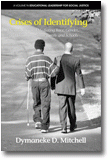
Crises Of Identifying
Negotiating And Mediating Race, Gender, And Disability Within Family And Schools
By:
Dymaneke D. Mitchell, National Louis University
A volume in the series: Educational Leadership for Social Justice. Editor(s): Jeffrey S. Brooks, Curtin University. Denise E. Armstrong, Brock University. Ira Bogotch, Florida Atlantic University. Sandra Harris, Lamar University. Whitney Sherman Newcomb, Virginia Commonwealth University. George Theoharis, Syracuse University.
Published 2013
Although there has been an increase in literature regarding children of color with disabilities, it mainly focuses on their experiences in one social context. Crises of Identifying: Negotiating and Mediating Race, Gender, and Disability within Family and Schools includes narratives on the familial and educational experiences in public, private, and institutional educational settings of five African American adults who have disabilities associated with blindness, cerebral palsy, and speech impairment. As a deaf African American female, the author and researcher also highlights her familial and educational experiences throughout the book as a frame of analysis. This book can serve as a literary resource to academics and educational programs and/or institutions as well as an informational guide to parents, teachers, administrators, and paraprofessionals/caregivers of children with disabilities regarding the significance of leadership, advocacy, activism, and identification development within familial and educational contexts on the experiences of children including the impact of complex dynamics that exist within and between families and schools.
Hopefully, this book will provide parents, teachers, administrators, and paraprofessionals with an understanding and comprehension of complexities concerning disability, gender, and race within family and schools including their association with crises of identifying, essentialist discourses, as well as power and privilege dynamics. This book consists of nine chapters which are organized into three parts. Part I focuses on background, rationale, theoretical and methodological underpinnings of the research this book is based on. Part II introduces the reader to the narratives of five African Americans with disabilities. Each narrative provides insights into the lived experiences and leadership qualities of two males and three females. Part III presents the concluding chapters of the book and highlights the significance of this research for the educational field including disability studies, teacher education programs, and special education.
CONTENTS
Series Editor’s Preface. Preface. Acknowledgements. PART I: TRYING TO ATTAIN ESSENCE. 1 Negotiating and Mediating Identities and Contexts. 2 Universalism and Intersectionalities. PART II: INTERCONTEXTUALITY. 3 Are You a Trekkie? 4 I Don’t Like to Be Pigeonholed. 5 My Mother Was Like My Bodyguard. 6 I’m Not Crippled; I’m Handicapped. 7 I Don’t Want to Be Seen in Public with You. PART III: SIGNIFICANCE OF RESEARCH. 8 Emerging Themes. 9 Conclusions and Recommendations. References.
-
Paperback9781623960919
Web price: $45.04 (Reg. 52.99)
-
Hardcover9781623960926
Web price: $80.74 (Reg. 94.99)
- eBook9781623960933

- EDU029040 - EDUCATION: TEACHING METHODS & MATERIALS: Social Science
- EDU032000 - EDUCATION: Leadership
- EDU026000 - EDUCATION: Special General
-
 Adult Intentions, Student Perceptions
How Restorative Justice is Used in Schools to Control and to Engage
Adult Intentions, Student Perceptions
How Restorative Justice is Used in Schools to Control and to Engage
-
 Crossing the Bridge of the Digital Divide
A Walk with Global Leaders
Crossing the Bridge of the Digital Divide
A Walk with Global Leaders
-
 Dear Gay, Lesbian, Bisexual, And Transgender Teacher
Letters Of Advice To Help You Find Your Way
Dear Gay, Lesbian, Bisexual, And Transgender Teacher
Letters Of Advice To Help You Find Your Way
-
 Envisioning a Critical Race Praxis in K-12 Education Through Counter-Storytelling
Envisioning a Critical Race Praxis in K-12 Education Through Counter-Storytelling
-
 Restorative Practice Meets Social Justice
Un-Silencing the Voices of "At-Promise" Student Populations
Restorative Practice Meets Social Justice
Un-Silencing the Voices of "At-Promise" Student Populations
-
 School Leadership in a Diverse Society
Helping Schools Prepare all Students for Success (2nd Edition)
School Leadership in a Diverse Society
Helping Schools Prepare all Students for Success (2nd Edition)
-
 Within Reach
Providing Universal Access to the Four Pillars of Literacy
Within Reach
Providing Universal Access to the Four Pillars of Literacy

